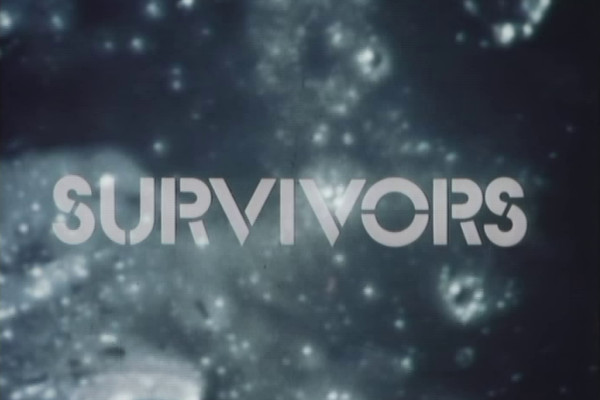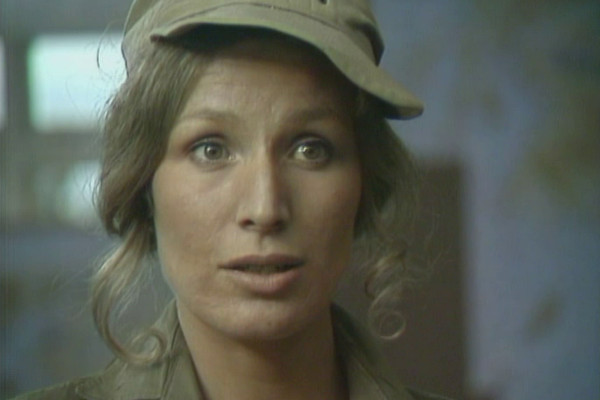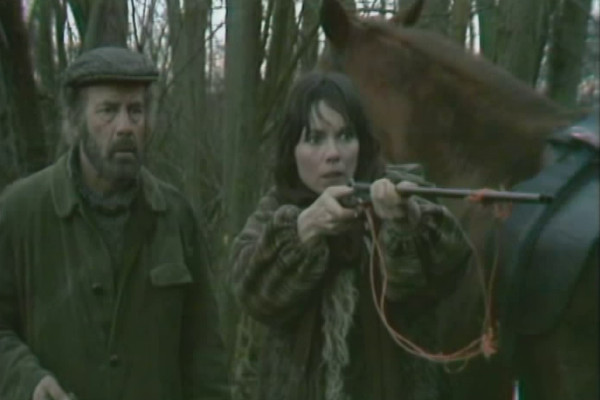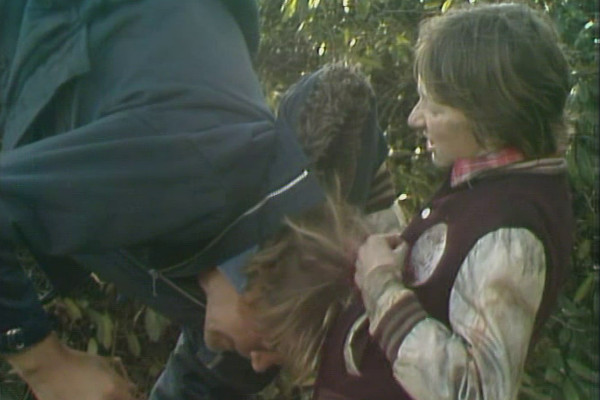


The third series ran from March-June 1977, and was the last of the series. Is it a perfect ending? Please join me in finding out, as I rank the third series from worst to best...
Spoiler Warning: Although spoilers have been avoided as much as possible, some significant plot elements are inevitably discussed...

Before getting into the various pros and cons of the third series of Survivors, let's simply take Long Live The King off the table as part of the discussion. It's not just that it's bad, it's more that it's like a puzzle piece that scarcely belongs to the same puzzle. Suddenly the Norwegian Agnes (played by Sally Osborn in the second series finale, but by Anna Pitt for series three) has become almost a military warlord, determined to set up a new government in Greg's name by any means possible.
Tonally, it's less like an episode of Survivors, more like an outtake of the Two Ronnies serial The Worm That Turned. Anna Pitt does well throughout the third series, but gives an astonishingly poor performance here, yet such things are probably more due to Agnes changing characterisation and motivation from scene to scene - sometimes even between lines.
It wasn't something that went unnoticed by Pitt herself, as she revealed in an interview with Kevin Marshall, for the book The Making of Terry Nation's Survivors: "Series three of Survivors was very disjointed and Agnes' part was one of the most disjointed of all. In this episode she suddenly becomes a different person without there ever having been any natural progression." It's a quote that sums up the problem perfectly, and series three of Survivors would still make sense without this one ever having existed.
Pitt didn't regard the working environment as a happy one, so much so that it made her think twice about wanting to continue acting after the experience. But perhaps the worst part of this deeply misguided piece of nonsense is that not only does it waste the talents of the typically brilliant Roy Marsden, but it also adds a lengthy, unseen post-story to The Last Laugh which completely undermines it. Not only is the episode ludicrous nonsense in and of it itself, but it even retroactively tarnishes the brilliance of one of the finest instalments.

One thing that really constrains the third series is the lack of strong script editing. Five writers contribute to the run, but they often seem to be pulling in different directions, with no clear progression. So that while Hubert gets developed throughout the earlier episodes, here, thanks to Roger Parkes, he's back in "comedy bumpkin" mode, a reset that would remain for the rest of the series.
There's also the problem of Jenny, saying how she wants to be with the children, but keeps going on journeys with Charles. Such things are an example of the force of the plot being in direct conflict with character motivation. With the (generally welcome) decision to bring the third series back to the more adventure origins of the first, it means that Jenny has to tag along otherwise she simply couldn't be in the show any more. But as Jenny doesn't want to go, and does so against her instincts, it means she spends huge chunks of the episodes complaining, which does begin to drag after a while.
It doesn't help that Parkes delivers scripts where any subtext is delivered in chunks by one character to the next, unsubtle even by the usual standards of the show, and there's awful dialogue like Jenny being forced to say of new regular Alec Campbell: "He's human. He's a man. With feelings." There are definitely some very strong episodes in series three, but there's an overall lack of cohesive quality, with past regulars like Pet, Jack and even the children restyled as just bit part cameos for the bulk of the run. The second series definitely had its fair share of problems, but did feel more consistent and immersive.

John Abineri does good work with the series as Hubert, trying his best to make what is often a two-dimensional character more believable. In essence a retread of Tom Price, Abineri nevertheless performs the comedy elements of the character without ever quite going over the top, and does his best to build the part.
Series three sees a shift in the dynamic, with Hubert taking matters into his own hands during Law of the Jungle and resolving the situation in a direct way. Yet despite such advances, this episode takes Hubert back several light years. While he's the only character with the guile to hide a gun on his person in a gun-free settlement, he's soon knocked out and the weapon taken off him. But more concerning is his previously-unseen prejudice, having to utter the line "They've got a darkie here, blacker than old boot." Hubert had never shown such attitudes before, but such views wouldn't, of course, be put in the mouths of Charles or Jenny. It's always the series' inherent class problem that sees Hubert identified as "lesser" in the narrative.
The introduction of minorities into British television, however well-meaning, normally produces some of the cringiest moments, possibly because a lot of television is still written by white middle-class men who write like they've never even met someone from a racial minority in their lives. From a character in the new version of Doctor Who telling the Doctor not to "be frightened" because she's a Muslim, to the Commander in UFO saying he doesn't care if someone's "polka dot with red stripes", TV SF in the UK is littered with well-meaning but ultimately trite and ham-fisted attempts to depict minorities on screen.
So it is that Survivors presents viewers with an Indian character who, when she's not busy making curry, spends all day playing her sitar. This last point is also a curious one, as Survivors exists without incidental music, the desolation of the events depicted going by without any musical embellishment. It can take some getting used to, as it adds realism but perhaps makes some scenes lack atmosphere. Yet here not only do we hear Rutna (Heather Emmanuel) playing sitar notes, we also hear them when she isn't, in a rare foray into non-diegetic music. It's a strange step into a less clinical world, similar to the way that a small amount of previous episodes have used voiceovers.
This edition sees Edward Underdown join the group as a new regular, Frank Garner, for a couple of episodes. There's definitely interesting themes in this one, but they're overlaboured and contrivedly written, with characters who often seem to change personality from scene to scene, and the 1977 depiction of a racial minority seems, at best, quaint when viewed today.

Five writers were behind the final series of Survivors. Martin Worth wrote four scripts, Roger Parkes three, while Ian McCulloch and Don Shaw contributed two apiece. This opening episode was the sole work of producer Terence Dudley. It's actually reasonable, just disjointed, and the series' love of misdirection is getting a little worn at this stage. There's also some shocking exposition that would have made Terry Nation proud, including the unlikely revelation that Jenny doesn't know what a "junkie" is.
But arguably the main issue with the third series is how they deal with the absence of Greg. Ian McCulloch opted out of the series and only appeared in his own scripts, leaving ten episodes without his presence. As a result the third series has a plotline running all the way through it that's the quest for the missing Greg. All of which is fine in theory, except... he's not missing. He's in regular contact with the group via various methods of communication, every settlement they visit seems to know all about him, and he knows where they are when he's ready to go back to base anyway.
It defies logic that they risk losing further contact by chasing after him, particularly as he's mailing them to say that everything's okay. While it does ultimately amount to a great payoff (in essence, not in execution) that Greg has reunited the entire country, it makes no sense for the others to go around looking for him when they always seem to know where he is anyway. It gives the series a drive it doesn't need, plot mechanics that make no sense within the narrative.
Such matters undermine an episode that isn't bad, and was considered for a far higher ranking in this article. (In truth, while the lowest two episodes are terrible, and the highest two are superb, what comes in between is of a generally so-so standard.) Yet what really sinks this one is the confusing and confused ending, where Jenny appears to shoot a soldier dead, who's then up and alive in the next scene. Whether it's bad editing, direction, writing, or a mixture of all three isn't clear - but it does make a somewhat underwhelming beginning leave you scratching your head.

The third series of Survivors was actually presaged by a second novel, published at the start of 1977. The writer Peter Hill, who had done scripts for The Sweeney and Z-Cars but not Survivors, wrote Survivors: Genesis of a Hero under the pseudonym John Eyers. More of a sequel to Terry Nation's novel than the series itself, it hasn't been looked at here due to its tenuous connection to the series and not being written by someone involved in the show, but is there to read should you wish to.
Big Finish, the audio company who like to make audio stories of pretty much everything (though have yet to tackle Budgie, Tottie or the R White's Lemonade adverts) got some of the original cast members in to make their own audio stories set during the series. Then there was a reboot of the series on the BBC from 2008-2010, which actually wasn't too bad, but axed after two series due to low ratings.
Yet for the original series, it ended here. Due to the extreme weather conditions while filming the episode Mad Dog, reshoots were required, which meant that there wasn't enough time in the schedule to shoot a fourth script by Roger Parkes. Consequently, the third series was an episode shorter than the others, and here we are with the series' slightly flat, repetitive final episode. An episode that sees electricity restored. A great deal of the third series brings artificial drama, so that Charles is unremittingly confrontational, even by his own usual standards, and the creation of electricity isn't met with joy, but with immediate childish squabbling about who owns it. Although such things are obviously a subtext on mankind's inherent nature - albeit without so much of the "sub" - it does feel forced.
Adding to this is a saboteur in the form of ex-heroin addict Sam Mead, played by Robert Gillespie. The survivors having someone amongst their number who is secretly plotting to undermine them, known to the viewers for three episodes, but unknown by the characters, is a great one on paper, but doesn't really come off. Maybe in the more operatic world of Doctor Who an "enemy within" can work when cast against type, as with the brilliance of the enjoyably hammy Turlough. But having an ex-junkie and would be destroyer of energy brought to life in the form of the dad from Keep It In The Family just doesn't come alive.
It's an okay episode, and Iain Cuthbertson is always good value. You can even enjoy it more by pretending that it's a sequel series to Budgie and that he's playing Charles Endell undercover (which would explain his uncomfortable reaction when Charles introduces himself.) But such daft fantasy games can't take away from the fact that so much of the runtime is spent with characters we don't even really know, while long-standing regulars such as Pet are discarded from the narrative altogether.

This third series of Survivors definitely has its moments, yet the fact that an episode as confused and misguided as this one could get anywhere near the top five shows how low the overall quality control was.
Written by Ian McCulloch, it sees his character of Greg bullied by a settlement of schoolchildren, before developing astonishing deductive skills to solve everything and save the day, while supporting characters have inconsistent motivation. McCulloch knew it didn't come off, and laid the blame entirely at the feet of the director, George Spenton-Foster. McCulloch's insistence upon this is maybe discourteous, but also possibly a serious factor.
As a very indulgent aside, many years ago in Blake's 7 reviews on this site I used to give the director the childish nickname of "George Spent-On-Foster's", purely because his episodes always looked so cheap. I was a younger Anorak back then, but the puerile idea was to conjure up a mental image of a man who would rather take the show's budget down to the local shop and blow it all on booze rather than spend any on the productions he was supposed to be making.
Obviously this very childish joke was inspired by his name hardly needing to be changed, but I wasn't aware at the time that the director did have a serious drinking problem, and reputedly died from alcohol-related health issues shortly after his 67th birthday. So what was just a very silly, childish and throwaway gag could have actually appeared as if I was making light of a serious illness, but was in fact just a horrible coincidence, and completely unintended.